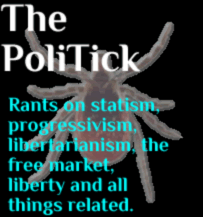So here's what I said.
Uhhhh...no. Conservatives have no desire to concentrate power, and neither do libertarians. You actually have the distinction backwards, in that liberals seek to invest elites--government authorites--with power. And you badly mischaracterize libertarianism in general. It is not new. It is in fact the founding principle of the United States. Reread the Declaration of Independence. You'll find it to be a wonderfully complete and nuanced expression of the Non-Aggression Principle and its consequences. The Revolutionaries went to war to secure for themselves a free market.
You also get basic history wrong when you attribute the wealth concentration to Reagan. If this is another "Reaganomics forces wealth upwards" assertion, as it appears to be, you are in need of some basic education on economics and history. What is called "Reaganomics" was only in play for a few scant months, in 1980 and 1981, before the congressional Democrats reneged on their agreement to cut taxes and government spending. Since Reagan, only Clinton has fully embraced supply-side policy (in 1997), and again, only briefly. What liberals deride as "trickle-down" has never actually existed, and certainly doesn't exist now.
The one-two punch of Volcker and Reagan (with an assist from Tip O'Neill and Congress) ended Stagflation, which itself was the consequence of Carter's misguided Keynesianism. Reaganomics worked. The Volcker contractionary policy tamed inflation, at the cost of imposing a sharp recession, but the tax and spending cuts ended that in short order (just as they had during the Depression of 1920).
But wealth concentration has nothing to do with Reaganomics. There are two main factors driving wealth upwards: regulation and the national debt.
A full discussion of how regulation cartelizes wealth is beyond the scope of a single comment, but it basically results from two forces: regulation that tilts the market in favor of larger players (those who can best exploit economies of scale), and regulations that impose barriers to entry to markets (shifting those markets from pure competition toward oligopoly). Econ 101: there are no long-run economic profits in the pure competition model. "Unfettered capitalism" cannot drive wealth upwards. The second force is deficit spending, which when carried over from year to year results in efforts on the part of the federal government to refinance that debt by issuing bonds. Bonds are bought by those who can afford them, including various funds and the very wealthy. When these bonds mature, the government pays back the principle with interest. The interest comes straight from the Treasury. Government bonds are a scheme to hand over taxpayer money to the very wealthy.
Your uncharitable commentary bespeaks a bigoted outlook on those who disagree with you. Instead of simply engaging in screeds, why not actually talk to whose who disagree with you? Critical thinking demands fair-mindedness, and it looks like you could use some of that.
I later added a postscript, and then another when it became clear that my original comment wouldn't be posted. Even a 10th-grade civics student could point out to him that libertarians do not "believe in fewer checks and balances on power than typical conservatives." Libertarians have the most stringent requirements vis-a-vis checks on power of any ideology (save anarchists).
Where, exactly, does he think power resides?
The market has no power. The citizenry has very little power; only their right to keep and bear arms prevents the government from owning a pure monopoly on the use of force.
Limiting government's expansion is checking power.
But I suspect that is where the exchange, such as it is, grinds to a halt. To persist in my effort to get a response would quickly become trolling, and possibly escalate to harassment.
But his reticence to engage demonstrates something I've found to be fairly common to the leftist mindset: egocentric thinking. No one can advance as a thinker, nor even claim to be a critical thinker in the slightest regard, without a willingness to subject one's self to critique. This is why I prefer to spar in social media, where you're forced to defend your thesis and are exposed to myriad contrary viewpoints. I'm often amused by how entrenched the "progressive" perspective is. Those who fall into it often remain mired there for life. How far can you have evolved as a person if you're still professing the same opinions you held as an adolescent?
Egocentric thinkers, for all their failings as thinkers, are remarkably good at justifying their egocentricism, and at convincing themselves that they are already perfect critical thinkers, and that all opposing views are personal insults to be dismissed.

No comments:
Post a Comment